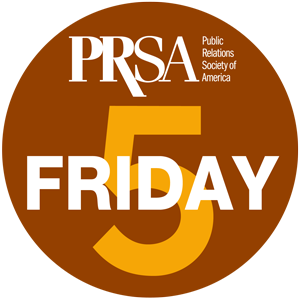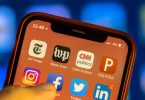We often boast that technology has made our personal and professional lives easier. Thanks to various advances, ingenious resources and innovations, we now have a near-endless encyclopedia in the palm of our hands, we are accessible at all times and we can reach millions of stakeholders from across the nation or around the world with one tweet. But when something goes wrong, technology can also be our kryptonite and make our jobs as communication professionals much more complicated.
 In this week’s Friday Five – an analysis of the week’s biggest public relations and business news and commentary – we’ll look at five stories that exemplify how technology impacts public relations. We’ll discuss an unfortunate choice for a hashtag, a quest to fight Ebola through social media, the rise and fall of the banner ad and new productivity tools for professionals on the go. We’ll also take a look at a teenager who became famous overnight for simply doing his job.
In this week’s Friday Five – an analysis of the week’s biggest public relations and business news and commentary – we’ll look at five stories that exemplify how technology impacts public relations. We’ll discuss an unfortunate choice for a hashtag, a quest to fight Ebola through social media, the rise and fall of the banner ad and new productivity tools for professionals on the go. We’ll also take a look at a teenager who became famous overnight for simply doing his job.
Bashtag: Cowboys + UK equals Twitter taunting for Dallas’ trip (The Dallas Morning News)
As the NFL heads to London to once again showcase America’s version of football to a European audience, communicators from each participating team have rightfully earmarked the event for fun promotions. One team’s social media staff, however, may have needed a few more brainstorming sessions before settling on a hashtag for the trip.
The Dallas Cowboys began tweeting with the hashtag “#CowboysUK” which was quickly ambushed and through the slightest change to one capital letter transformed to “CowboySuk,” meaning something totally different than originally intended. Mike Babcock, producer for TMZ Sports, put the backlash in simple terms:
looking for a job in Dallas? the Cowboys likely have an opening in the social media department. #CowboysUK
— mike babcock || tmz (@michaeljb1) November 4, 2014
How do you ensure your hashtag doesn’t become “bashtag” worthy before implementing a campaign? Read the full article and let us know your tactics in the comments section below.
Facebook Fights Ebola With Donate Button Atop Feed, Free Internet For Aid Workers In Africa (TechCrunch)
Technology has provided us the ability to spread important information during a crisis, and Facebook is using its platform to do its part to help combat the Ebola crisis. Not only did Mark Zuckerberg donate $25 million to the cause, he is also using the power of Facebook to help aid workers communicate and influence others to donate.
Josh Constine of TechCrunch explains how Facebook is hoping to help: “Facebook will pay for Feed ads promoting UNICEF posts of Ebola safety info in affected regions. And Facebook will donate 100 satellite Internet hotspots via NetHope to medical facilities and NGOs in remote areas of Guinea, Liberia and Sierra Leone. These will let aid workers and patients use voice and web connectivity to battle Ebola and stay in touch with loved ones.”
This week, Facebook has also pinned a donate button at the top of users News Feed in 30 countries to encourage charitable giving. Learn more about this common sense philanthropic mission by Facebook via the full article.
Fall of the Banner Ad: The Monster That Swallowed the Web (The New York Times)
How did the banner ad go from an admired marketing tool to the bane of Internet users’ existence? Farhad Manjoo, New York Times reporter, examines the history of the tool and why they’ve become so ineffective. Manjoo explains that the space was sold quickly and cheaply, and companies had believed that views were the ultimate goal.
Why are they falling out of favor in 2014? Other than annoying Internet users, Manjoo clarifies: “These days, finally, the banner ad is in decline. That is because the web, the medium in which it has thrived, is also in decline. Today we live in a mobile, social world, spending most of our time online using apps that load faster and are much prettier and more useful than websites. Instead of banners, many of these apps, including Facebook, Twitter and Instagram, make money through ads that appear in users’ social feeds, rather than off to the side of the page.”
Read more about the rise and fall of the banner ad via the New York Times.
Microsoft unveils new free Office apps for iPhone (USA Today)
While Apple products are widely used for business purposes today, some have held off on making the iOS switch because of the devices lack of functionality with the Microsoft Office suite. Yesterday, however, Microsoft announced that they are ready to play nice in a big way.
Nancy Blair of USA Today describes the new, free, office apps for the iPhone and iPad: “Office software lets you create and edit documents, calculate spreadsheets and design presentations and graphics. Microsoft moved to a subscription model for Office last year. As of today, though, anyone using an Office mobile app on a smartphone or tablet can create and edit across the core apps for free. You’ll still need an Office 365 subscription for premium features, including more advanced editing of Word docs, images and charts.”
Are you a holdout? Will this announcement change your mind? Read the full article on USA Today.
WTF is ‘Alex from Target’? (Digiday)
Mobile devices have allowed us to shoot video and photos at anytime, anywhere, transforming what may have once been considered the most mundane of tasks something that you now share with your family, friends and quite frankly, the entire world. It also, coupled with the power of social media, has the ability to make someone who is minding their own business a household name. “Alex from Target” is a prime example of this phenomenon.
Alex, a male teenage Target employee, was thrust into internet-fame when a customer took his photo and shared it via Twitter. There has been some discussion on whether this was a publicity stunt orchestrated by Target or one of its agencies, but regardless, it has been a boon for their communications team. Eric Blattberg from Digiday explains: “Amobee Brand Intelligence measured a 274 percent boost in consumption of Target-related content across the Web from Saturday (before the meme took off) to Wednesday afternoon. Additionally, from Sunday to Wednesday afternoon, Amobee saw 2.9 million tweets referencing “Target,” compared to 2.2 million referencing the hashtag #AlexFromTarget.”
Is it possible to replicate the success of the #AlexFromTarget case? Read the full article and share your thoughts in the comment section below.
Rosanne Mottola is the public relations manager for the Public Relations Society of America.






